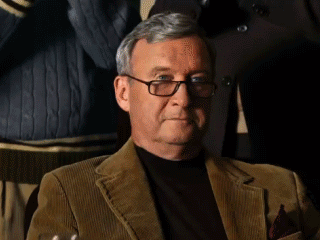-
Welcome to rpgcodex.net, a site dedicated to discussing computer based role-playing games in a free and open fashion. We're less strict than other forums, but please refer to the rules.
"This message is awaiting moderator approval": All new users must pass through our moderation queue before they will be able to post normally. Until your account has "passed" your posts will only be visible to yourself (and moderators) until they are approved. Give us a week to get around to approving / deleting / ignoring your mundane opinion on crap before hassling us about it. Once you have passed the moderation period (think of it as a test), you will be able to post normally, just like all the other retards.
You are using an out of date browser. It may not display this or other websites correctly.
You should upgrade or use an alternative browser.
You should upgrade or use an alternative browser.
People News RIP Wizardry co-creator Andrew Greenberg
- Thread starter Infinitron
- Start date
- Joined
- Mar 6, 2016
- Messages
- 4,847



Apparently he's also the guy who made sure VTM Bloodlines could be released in a passable state.Also if anyone is interested, the guy who reported on Andrew's death is David Mullich who worked on Heroes of Might and Magic III. He even made it into the game.

This was his ingame description:
Generally stoic, Sir Mullich is prone to spasmodic fits of uncoordinated excitement believed to intimidate his troops into working faster.
Good article and really is a nice history lesson about way back. The only fault is the digs at Gygax and TSR. The article states quite a few times that:This Digital Antiquarian's blog post about Greenberg's contribution to Wizardry: https://www.filfre.net/2012/03/making-wizardry/
After a couple of days, he [Greenberg] says that, “I was getting tired of these same games. I was bored and complained about my boredom.” A friend suggested offhand that he go put Dungeons and Dragons on a computer.
So if Gygax sued him for hitting a little too close to home, its understandable. Also just underscores how important D&D was in the early days of computing, with Garriott, Greenberg, Fargo, Woodhead, Spector, even Gygax himself having played D&D.
Kind of interesting to think how things would have panned out if TSR had sued more.
There was no possible way to escape from the influence of Dungeons and Dragons. Considering that there was literally a game on the PLATO system called Dnd which helped inspired Moira also on the PLATO system which helped inspire Wizardry.
even Gygax himself having played D&D.
You don't say!

Nice to see so many pre-millenial/GenX Codexers posting their praises of Greenberg and memories of Wizardry... 

Last edited:
DemonKing
Arcane
- Joined
- Dec 5, 2003
- Messages
- 6,648
I can't say Wizardy I was the first CRPG I ever played (think that was Temple of Aphasi or Akalabeth) but this was the one that resonated with me the most as a neophyte AD&D player in the early 80s.
I'll miss the vorpal bunnies and those annoying Bleebs that always called for help the most...


I'll miss the vorpal bunnies and those annoying Bleebs that always called for help the most...


Last edited:
Nas92
Augur
- Joined
- Oct 20, 2014
- Messages
- 652
I can't say that Wizardry was my first RPG, not by a longshot. I've only really played Wiz8, I've played some of Wiz7. Always wanted to play the early games, but for me they've already taken on an almost mythic quality. Like you'd have to be 200 IQ to even start playing.
It's depressing that the giants of this genre are dying off and he wasn't even particularly old.
Was he involved in the remake in any way? Or had he completely checked out of game development?
It's depressing that the giants of this genre are dying off and he wasn't even particularly old.
Was he involved in the remake in any way? Or had he completely checked out of game development?
luj1
You're all shills

The first Wizardry I played was Wizardry 6 and it's still my favorite. Idk why but crawlers with basic presentation and 1-2 tilesets are *hugely* atmospheric for me
Or had he completely checked out of game development?
Does chasing Bradley out of Wizardry and taking down Sir-Tech count as being in game development?
La vie sexuelle
Learned
I miss the days when the word "developer" or "programmer" meant a middle-aged man in a plaid shirt and a fatherly smile.
- Joined
- Oct 1, 2018
- Messages
- 8,827
People should look into when Greenberg sued Sir-Tech in the early 90s because they were screwing him out of royalties. For some reason, he named Bradley in the suit, forcing a guy who had literally nothing to do with any of the business dealings to show up in court and go through a ton of bullshit when he just wanted to focus on making Wizardry 7. Bradley left Sir-Tech shortly thereafter instead of sticking around to make Wizardry 8.Or had he completely checked out of game development?
Does chasing Bradley out of Wizardry and taking down Sir-Tech count as being in game development?
- Joined
- Jun 21, 2018
- Messages
- 4,264

Sounds reasonable to me, given that Bradley made Wiz 5 using Greenberg's engine/assets. Finding out how much of the game could be attributed to which party would be relevant, and Bradley himself will have been the best person to ask.People should look into when Greenberg sued Sir-Tech in the early 90s because they were screwing him out of royalties. For some reason, he named Bradley in the suit, forcing a guy who had literally nothing to do with any of the business dealings to show up in court and go through a ton of bullshit when he just wanted to focus on making Wizardry 7. Bradley left Sir-Tech shortly thereafter instead of sticking around to make Wizardry 8.Or had he completely checked out of game development?
Does chasing Bradley out of Wizardry and taking down Sir-Tech count as being in game development?
- Joined
- Oct 1, 2018
- Messages
- 8,827
Bradley originally pitched Heart of the Maelstrom to Sir-Tech as a non-Wizardry title. They liked it, but recommended he rewrite it to be a part of the Wizardry series, which he did. It didn't use any of the original Wizardry code.Sounds reasonable to me, given that Bradley made Wiz 5 using Greenberg's engine/assets. Finding out how much of the game could be attributed to which party would be relevant, and Bradley himself will have been the best person to ask.
My first Wizardry game was actually one of the Japanese spin offs on a Playstation 2 or 3 back in the day, much later on I played Wizardry 6. It's a series that I always knew I'd like, but generally didn't have a computer to run it and/or was getting other stuff like D&D licensed games or Might and Magic, The Bard's Tale, etc. .
I always remember seeing the ads for them and wanting to try them though and seeing how influential they really were.
I always remember seeing the ads for them and wanting to try them though and seeing how influential they really were.
- Joined
- Jun 21, 2018
- Messages
- 4,264

Yeah, you're right, Greenberg had nothing to do with the game whatsoever.Bradley originally pitched Heart of the Maelstrom to Sir-Tech as a non-Wizardry title. They liked it, but recommended he rewrite it to be a part of the Wizardry series, which he did. It didn't use any of the original Wizardry code.Sounds reasonable to me, given that Bradley made Wiz 5 using Greenberg's engine/assets. Finding out how much of the game could be attributed to which party would be relevant, and Bradley himself will have been the best person to ask.


- Joined
- Oct 1, 2018
- Messages
- 8,827
Not sure where you're going with this. He was a rights holder. Go figure that they would include his name. He didn't even do the coding on the original game; that was Woodhead.Yeah, you're right, Greenberg had nothing to do with the game whatsoever.Bradley originally pitched Heart of the Maelstrom to Sir-Tech as a non-Wizardry title. They liked it, but recommended he rewrite it to be a part of the Wizardry series, which he did. It didn't use any of the original Wizardry code.Sounds reasonable to me, given that Bradley made Wiz 5 using Greenberg's engine/assets. Finding out how much of the game could be attributed to which party would be relevant, and Bradley himself will have been the best person to ask.


Greenberg was a Law student at the time and eventually became a lawyer specialized inintellectual property stuffvengeful lawfare against those who've wronged him, even if the franchise he had created had to become collateral damage.
FTFY
- Joined
- Jun 21, 2018
- Messages
- 4,264

If he was a rights holder, he was entitled to royalties, so it makes sense for them to have wanted to figure out how much of the game was his, which means Bradley needed to be involved. The blame lies squarely with Sir-Tech for not paying Greenberg what he was owed.Not sure where you're going with this. He was a rights holder. Go figure that they would include his name. He didn't even do the coding on the original game; that was Woodhead.Yeah, you're right, Greenberg had nothing to do with the game whatsoever.Bradley originally pitched Heart of the Maelstrom to Sir-Tech as a non-Wizardry title. They liked it, but recommended he rewrite it to be a part of the Wizardry series, which he did. It didn't use any of the original Wizardry code.Sounds reasonable to me, given that Bradley made Wiz 5 using Greenberg's engine/assets. Finding out how much of the game could be attributed to which party would be relevant, and Bradley himself will have been the best person to ask.


:Flash:
Arcane
- Joined
- Apr 9, 2013
- Messages
- 6,800
It does use the original Wizardry engine. They not only forced him to rewrite it to be part of Wizardry, they also forced him to rewrite it using the Wizardry engine. He had to throw away his entire code.Bradley originally pitched Heart of the Maelstrom to Sir-Tech as a non-Wizardry title. They liked it, but recommended he rewrite it to be a part of the Wizardry series, which he did. It didn't use any of the original Wizardry code.Sounds reasonable to me, given that Bradley made Wiz 5 using Greenberg's engine/assets. Finding out how much of the game could be attributed to which party would be relevant, and Bradley himself will have been the best person to ask.
Then they held it back two years, because Wizardry IV wasn't finished yet.
Bradley's C Heart of the Maelstrom was finished in 1984. Wizardry V was released in 1988. That was the genius of the Sirotek brothers.
https://web.archive.org/web/20010217041727/http://rpgvault.ign.com/features/interviews/wizwar.shtml
KeighnMcDeath
RPG Codex Boomer
- Joined
- Nov 23, 2016
- Messages
- 15,948
this guy dies and Crispy is still alive. shame

Bruma Hobo
Lurker
- Joined
- Dec 29, 2011
- Messages
- 2,484
They were pretty dumb then. As much as I like the Bradley games, these were clearly constrained by the Wizardry engine and its game loop, and by the time of the Dark Savant Trilogy, his games played nothing like an actual Wizardry game should. Today only Japan is making actual Wizardry games, and they're pretty bad at it.It does use the original Wizardry engine. They not only forced him to rewrite it to be part of Wizardry, they also forced him to rewrite it using the Wizardry engine. He had to throw away his entire code.Bradley originally pitched Heart of the Maelstrom to Sir-Tech as a non-Wizardry title. They liked it, but recommended he rewrite it to be a part of the Wizardry series, which he did. It didn't use any of the original Wizardry code.Sounds reasonable to me, given that Bradley made Wiz 5 using Greenberg's engine/assets. Finding out how much of the game could be attributed to which party would be relevant, and Bradley himself will have been the best person to ask.
Then they held it back two years, because Wizardry IV wasn't finished yet.
Bradley's C Heart of the Maelstrom was finished in 1984. Wizardry V was released in 1988. That was the genius of the Sirotek brothers.
https://web.archive.org/web/20010217041727/http://rpgvault.ign.com/features/interviews/wizwar.shtml
Thank you Sir-Tech.
KeighnMcDeath
RPG Codex Boomer
- Joined
- Nov 23, 2016
- Messages
- 15,948
How exactly should a Wizardry game be made?
Cleveland Mark Blakemore
Golden Era Games


By competent people like Bradley and Greenberg.How exactly should a Wizardry game be made?
Modern kids will never understand what is being talked about. Not everybody was an imposter back then.
It's not nostalgia or sentimental. Programmers were better back then.
I only look good because everything is relative.
I was a mild hacker of a bunch of type-in games.
Greenberg was one of those classic coders who understood unit testing, qa testing and structuring his architecture so it could be adjusted in data, not in code.
It's one thing to say I understand quite a bit of this today. I taught myself and learned quite isolated from most of my peers because most of my peers are klownworld stock casting and have learned nothing at any point anywhere.
What is a semitalented hacker in 1990 is the world's smartest man alive today.
Greenberg would be so advanced, despite all the limitations of the hardware and software, that it is possible his code could be ported and would be as basically superior now as it was then. We're talking AAA design skills here.
Norman told me to steal it but try to make it look like it wasn't the original code. The Siroteks were like idiot baboons beating the ground in front of the 2001 monolith. They just wanted money to go to Atlantic City.









![Glory to Codexia! [2012] Codex 2012](/forums/smiles/campaign_tags/campaign_slushfund2012.png)
















